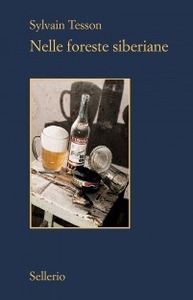Take a photo of a barcode or cover
Dans ce livre, Sylvain Tesson raconte les six mois où il a vécu en ermite dans une cabane de Sibérie. Ce livre n'est pas mauvais et a un certain intérêt. Comment un citadin peut-il s'adapter à une vie complètement opposée à celle qu'il vit?
Malheureusement pour moi, l'hiver en Sibérie m'a paru long froid et plate. L'auteur ne semblait n'avoir rien à faire de ses journées à part lire et boire. Les longues journées dans le froid de Sibérie m'ont fait penser à certaines lectures que j'ai fait où les personnages sont pris sur une embarcation en pleine mer. La lecture devient longue parce parce que les personnages principaux n'ont rien d'autre à faire que réfléchir.
Après la lecture de ce livre, je peux dire que les récits n'est pas mon type préféré de lecture. Je préfère définitivement les romans qui ne sont pas limités à ce qu'ont vécu les auteurs.
Malheureusement pour moi, l'hiver en Sibérie m'a paru long froid et plate. L'auteur ne semblait n'avoir rien à faire de ses journées à part lire et boire. Les longues journées dans le froid de Sibérie m'ont fait penser à certaines lectures que j'ai fait où les personnages sont pris sur une embarcation en pleine mer. La lecture devient longue parce parce que les personnages principaux n'ont rien d'autre à faire que réfléchir.
Après la lecture de ce livre, je peux dire que les récits n'est pas mon type préféré de lecture. Je préfère définitivement les romans qui ne sont pas limités à ce qu'ont vécu les auteurs.
reflective
slow-paced
Prachtig filosofisch reisboek over de mens en de natuur. Zes maanden lang beschrijft Tesson zijn omgeving, z'n hondjes en de sporadische ontmoetingen met Russen en wodka.
adventurous
inspiring
reflective
medium-paced
adventurous
reflective
slow-paced
inspiring
reflective
slow-paced
This is the diary of a thirty-eight-year-old French writer who decides that, for a period of six months, he will stay in a cabin, three meters long by three meters wide, on the shore of lake Baikal. From Winter to Summer, from fear to joy to pain to peace, this short book is a patient and attentive celebration of nature and the instant.
"J'ai été libre, car sans l'autre la liberté ne connaît plus de limite", says Sylvain Tesson at the end of his book. "I have been free, for without the other, freedom knows no more boundary". Very rarely has a book had the power to slow me down and put me in a state of contemplation, "this word that cunning people give to laziness".
This is not a perfect book. But from now on it will travel with me.
"J'ai été libre, car sans l'autre la liberté ne connaît plus de limite", says Sylvain Tesson at the end of his book. "I have been free, for without the other, freedom knows no more boundary". Very rarely has a book had the power to slow me down and put me in a state of contemplation, "this word that cunning people give to laziness".
This is not a perfect book. But from now on it will travel with me.
Arrêté à 67%. Plus digeste que le dernier que j'ai lu, mais ce n'est pas ma tasse de thé. Ma vision des livres de voyages ne matche pas le style de Tesson. Pas assez naturel face à une nature dont on se doit d'être humble. Un humour mal placé qui casse le rythme et le peu de moments agréables passés. Un manque de spontanéité profond. Ce que je retiens de bon est l'approche historique de Tesson sur la Sibérie et l'URSS d'autrefois. Un voyageur qui dit vouloir quitter son cocon bourgeois mais qui respire le privilège dès lors qu'il s'exprime.
Un peu longuet, mais certain passages sont touchants et d'autres drôles au milieu du vide de la Sibérie. L'expérience est intéressante, mais voila 6 mois de solitude en cabane, faut pas s'attendre à du palpitant.
Je pense que je l'ai lu à la mauvaise période aussi : je rentrais tout juste de vacances dans les montagnes parentales ou j'avais du temps et de la solitude, le retour à la capitale par une semaine de formation, passer de la compagnie discrète de mes parents à l'existence de groupe était fatigant et lire de la solitude par dessus ça devait pas être le bon combo. #3615mavie
Je pense que je l'ai lu à la mauvaise période aussi : je rentrais tout juste de vacances dans les montagnes parentales ou j'avais du temps et de la solitude, le retour à la capitale par une semaine de formation, passer de la compagnie discrète de mes parents à l'existence de groupe était fatigant et lire de la solitude par dessus ça devait pas être le bon combo. #3615mavie
I don't understand the hype at all, sorry. 'Guy goes into the woods to be a hermit and withdraw from the horrors of modern society' is a concept that's been done many times before - which doesn't mean it can't be done again, but it means there's more pressure to execute it well. And Tesson doesn't execute it well at all.
His narration is obnoxious, pretentious, and cliched - it's packed with references to other books written by dead white men (there's a three page list of books he brought to his cabin of which maybe two are written by women and two by people of colour, but there's about 5 books by Junger alone - so there's his priorities). I don't think books that reference other books are inherently bad but if you're not familiar with Nietzsche, Junger and Schopenhauer you're going to struggle to follow a lot of this. Also, Tesson is extremely condescending towards city residents and smug about his choice to live in the forests - which is annoying on its own, but what really bothered me is that he fails to acknowledge at any point how lucky he is to be able to abandon normal life and hang out in a forest for six months with no contact with the outside world. Does he not have bills to pay, responsibilities, dependents, or loved ones? Apparently he has a partner but we only hear her mentioned when she's breaking up with him near the end of the book - and honestly, who can blame her?
All of that aside though, the thing that brought this down to a one star instead of a two star review was the borderline ecofascist ideology that the author espouses. Tesson complains constantly about overpopulation ruining the environment, especially in reference to India and China. But what really took it over the line for me was when he got drunk with a group of Russian men, one of whom was struggling to conceive a child with his partner, and we get this passage:
"I don't dare console him by pointing out that the human anthill is about to explode. And that the French anthro pologist Claude Lévi-Strauss described our billions of humans as meal worms in an overcrowded habitat in which we're killing ourselves with our own toxins. And that the old master, worried about the demographic pressures now afflicting the Earth, had forbidden himself to make any prediction about the future' - he who'd been born in a world six times less densely populated. And that in his play The Dead Queen, the novelist and playwright Montherlant put these words in the mouth of the king when he discovers that his daughter-in-law is pregnant: My God, will it never end?' And that tossing an infant into the lions' cage is not, perhaps, the wisest thing to do. And that the desire to be a father is easily thwarted by maintaining a small fund of pessimism."
...Charming. In conclusion, I'd give this one a miss.
His narration is obnoxious, pretentious, and cliched - it's packed with references to other books written by dead white men (there's a three page list of books he brought to his cabin of which maybe two are written by women and two by people of colour, but there's about 5 books by Junger alone - so there's his priorities). I don't think books that reference other books are inherently bad but if you're not familiar with Nietzsche, Junger and Schopenhauer you're going to struggle to follow a lot of this. Also, Tesson is extremely condescending towards city residents and smug about his choice to live in the forests - which is annoying on its own, but what really bothered me is that he fails to acknowledge at any point how lucky he is to be able to abandon normal life and hang out in a forest for six months with no contact with the outside world. Does he not have bills to pay, responsibilities, dependents, or loved ones? Apparently he has a partner but we only hear her mentioned when she's breaking up with him near the end of the book - and honestly, who can blame her?
All of that aside though, the thing that brought this down to a one star instead of a two star review was the borderline ecofascist ideology that the author espouses. Tesson complains constantly about overpopulation ruining the environment, especially in reference to India and China. But what really took it over the line for me was when he got drunk with a group of Russian men, one of whom was struggling to conceive a child with his partner, and we get this passage:
"I don't dare console him by pointing out that the human anthill is about to explode. And that the French anthro pologist Claude Lévi-Strauss described our billions of humans as meal worms in an overcrowded habitat in which we're killing ourselves with our own toxins. And that the old master, worried about the demographic pressures now afflicting the Earth, had forbidden himself to make any prediction about the future' - he who'd been born in a world six times less densely populated. And that in his play The Dead Queen, the novelist and playwright Montherlant put these words in the mouth of the king when he discovers that his daughter-in-law is pregnant: My God, will it never end?' And that tossing an infant into the lions' cage is not, perhaps, the wisest thing to do. And that the desire to be a father is easily thwarted by maintaining a small fund of pessimism."
...Charming. In conclusion, I'd give this one a miss.




